|
|
|
Sort Order |
|
|
|
Items / Page
|
|
|
|
|
|
|
| Srl | Item |
| 1 |
ID:
126043
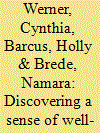

|
|
|
|
|
| Publication |
2013.
|
| Summary/Abstract |
Throughout Central Asia, the end of communism has been marked by a significant change in the management and influence of local mosques. In many rural areas, small underground mosques operated by informally trained, elderly moldas have been supplanted by newly constructed mosques led by younger, foreign-educated local imams and financed by governmental and private donations from Turkey, Saudi Arabia, and other countries. From several perspectives, this 'revival' of Islam is characterized in a way that implies that increased religiosity and piety is somewhat problematic. In this essay, based on six months of ethnographic fieldwork in Western Mongolia, we argue that such an approach prevents an understanding of how religious changes are enhancing the social and material well-being of certain actors. We explore the utility of the concept of well-being by focusing on the everyday lives of Kazakh imams in Western Mongolia. Approximately 100,000 ethnic Kazakhs live in the Western Mongolian province of Bayan-Ölgii, where they comprise about 80% of the population. Although a significant portion of the population has been migrating to Kazakhstan in the post-socialist period, the Kazakhs who choose to remain in Mongolia have experienced a significant increase in religious freedom. In this context, the new cohort of imams is playing an important mediating role as members of the local population reinterpret and renegotiate their identity as Muslims. In addition to finding spiritual well-being through their knowledge of Islam, these imams are acquiring social status and economic security from their local roles as religious leaders and through their transnational connections with a broader Muslim community.
|
|
|
|
|
|
|
|
|
|
|
|
|
|
|
|
| 2 |
ID:
126042
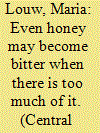

|
|
|
|
|
| Publication |
2013.
|
| Summary/Abstract |
In Kyrgyzstan, as in the rest of Central Asia, recent decades have witnessed a proliferation of distinctions between 'good' and 'bad' Islam. What is perceived as a growing 'religiosity' is often seen as a symptom of post-Soviet chaos and excess, but people equally tend to see Islam as an important source of well-being, for themselves and for society as such. It is argued that a general feature of the Islam many Muslims strive for - and occasionally experience glimpses of - is one that expresses, embodies and enables a balanced existence: a balance between well-being in this world and in the afterlife; a balance between the acceptance of one's fate and the attempt to improve one's situation; or a balance between adherence to abstract dogmas and respect for local moralities.
|
|
|
|
|
|
|
|
|
|
|
|
|
|
|
|
| 3 |
ID:
106443
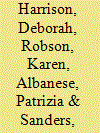

|
|
|
|
|
| Publication |
2011.
|
| Summary/Abstract |
Preliminary results of our survey of 1066 adolescent members of a Canadian Forces (CF) community, comparing the mental health and well-being of CF and civilian youth in a secondary school adjacent to an army base, yielded surprising results. The data were collected in 2008 with an instrument that replicated parts of the National Longitudinal Survey of Children and Youth (NLSCY). Our findings suggested that there are few statistically significant differences between CF and civilian youth on mental health and well-being measures. On the other hand, both the CF and civilian youth scored lower on crucial health and well-being measures than their peers in the national NLSCY sample. This research note attempts to explain these complementary findings, using data from follow-up semi-structured interviews we conducted in 2009/10 with 60 of the CF adolescents. It also considers the possibility of a ''spillover effect'' of military life stressors on civilian youth.
|
|
|
|
|
|
|
|
|
|
|
|
|
|
|
|
| 4 |
ID:
116508
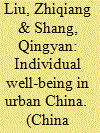

|
|
|
|
|
| Publication |
2012.
|
| Summary/Abstract |
Using household survey data, we study the determinants of individual well-being in urban China, emphasizing particularly the role of income expectations. First, we find that individual well-being increases contemporaneously with own income and decreases with community's average income, consistent with findings reported in previous studies. This result holds when we replace income with consumption and when we consider employment and health status of other family members. Second and more important, we find that income expectations have a positive and significant effect on individual well-being. This result is robust to alternative model specifications and to controls for optimistic personality. Instrumental variable estimates and endogeneity tests suggest that the positive relationship between well-being and income expectations is genuine. Our finding has the potential to explain why reported well-being has declined in China despite the spectacular economic growth in the past decades.
|
|
|
|
|
|
|
|
|
|
|
|
|
|
|
|
| 5 |
ID:
139555
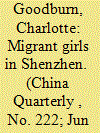

|
|
|
|
|
| Summary/Abstract |
This paper examines the impact of rural–urban migration on primary school-age migrant girls in China, providing important data on this unexplored group as well as drawing several larger conclusions about the evolving relationship between migration and women's autonomy. Much recent literature has focused on Chinese young unmarried women migrants. However, there has been no attempt to distinguish the effect of migration on children by gender, and little research on the “new generation” of married women migrants. This paper focuses on two aspects of migrant girls' well-being, education and migration satisfaction, and compares girls' assessments with those of their parents, particularly their mothers. It analyses differences between the views of both girls and parents, arguing that specific parental concerns about daughters shape girls' futures in ways that do not apply to migrant boys. A further, broader, implication of this analysis is that certain benefits of migration, previously thought to apply exclusively to single women, extend also to married women, influencing mothers when forming goals for their daughters' futures.
|
|
|
|
|
|
|
|
|
|
|
|
|
|
|
|
| 6 |
ID:
126034


|
|
|
|
|
| Publication |
2013.
|
| Summary/Abstract |
In May 2005, after a tumultuous parliamentary election campaign had led to factionalism among the village population, village elders in northern Kyrgyzstan formed the cooperative Yiman Nuru (Light of Faith). The institution, which is headed by the local imam, was set up with the explicit aim to restore harmony and unity among all villagers. This article deals with how people in rural Kyrgyzstan try to achieve a state of well-being for themselves. Specifically, it analyses a chart the elders created upon forming the cooperative, in which they order their social and economic practices, their moral duties and responsibilities vis-à-vis other villagers, as well as their relationship with state actors, along the lines of three moral concepts: harmony, unity, and moral conduct. This chart provides a unique opportunity to probe into people's reflexivity and their own ways of reasoning about the meaning of well-being.
|
|
|
|
|
|
|
|
|
|
|
|
|
|
|
|
| 7 |
ID:
126038
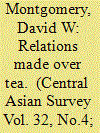

|
|
|
|
|
| Publication |
2013.
|
| Summary/Abstract |
Narratives of hardship and suffering found in portrayals of life in Central Asia elicit policy responses that attempt to remedy the situation through humanitarian or development interventions intended to enhance local well-being. This framing obfuscates a network of relationships and interactions that are instrumental in the making of meaningful lives in Central Asia. I explore the comfort of family and friends, the hope of possibility (real and imagined), and the happiness (even if fleeting) in the sharing of stories. Furthermore, even in the most trying of times, the communal sense that emerges in sharing concerns helps mitigate the stresses and strains of many social situations. Seeing these relationships as moments of well-being is essential to understanding everyday life and contextualizing hardship and suffering, and thus to conveying a fuller sense of what is understood as 'a meaningful life' in Central Asia.
|
|
|
|
|
|
|
|
|
|
|
|
|
|
|
|
| 8 |
ID:
126039
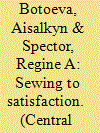

|
|
|
|
|
| Publication |
2013.
|
| Summary/Abstract |
This article focuses on the reassembling of apparel production in post-Soviet Kyrgyzstan. We contribute to this special issue on well-being in Central Asia by examining how individual craft-based apparel producers (a subset of producers in the apparel industry) describe the process through which they built upon their Soviet past and reoriented their professional trajectories in a new competitive market environment. These producers locate professional satisfaction in their ability to draw upon and creatively re-employ local knowledge and experience learned in Soviet institutions, ultimately - as they articulate and perceive - deriving pride and well-being from the process of selling highly regarded ethnically inspired apparel products both at home and abroad.
|
|
|
|
|
|
|
|
|
|
|
|
|
|
|
|
| 9 |
ID:
126037
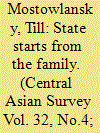

|
|
|
|
|
| Publication |
2013.
|
| Summary/Abstract |
Based on anthropological fieldwork between 2008 and 2011, this article focuses on how people in Tajikistan's eastern Pamirs conceptualize well-being through the establishment of peace and harmony. An exploration of the interactional use of the terms 'peace' and 'harmony' in Kyrgyz and Tajik (tynchtyk, yntymak, tinji, and vahdat) makes manifest that the meanings of these terms are connected to the fields of 'family', 'leadership', and 'state'. Basing their reasoning on the officially promoted analogy between family and state, people in the eastern Pamirs distinguish between social spaces that are related to well-being and those that are not. As a factor of distinction, and crucial to the establishment of peace and harmony, the moral quality of leadership plays an important role. Positive experiences of such leadership as balanced and morally pure are mainly identified and witnessed within families and neighbourhoods and only occasionally in state institutions. This discrepancy raises the question of where to locate boundaries between good and bad, moral and immoral, harmonious and conflictual. Thus, this article contributes not only to the study of local concepts of well-being in Central Asia but also to the study of local concepts of 'ill-being' which challenge them.
|
|
|
|
|
|
|
|
|
|
|
|
|
|
|
|
|
|
|
|
|